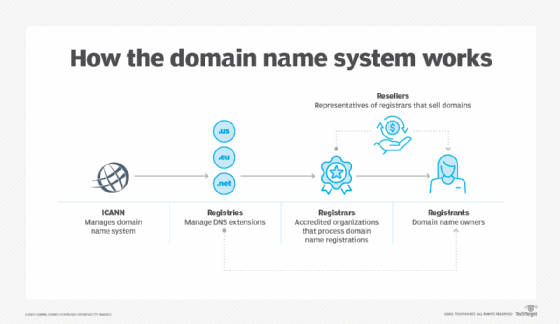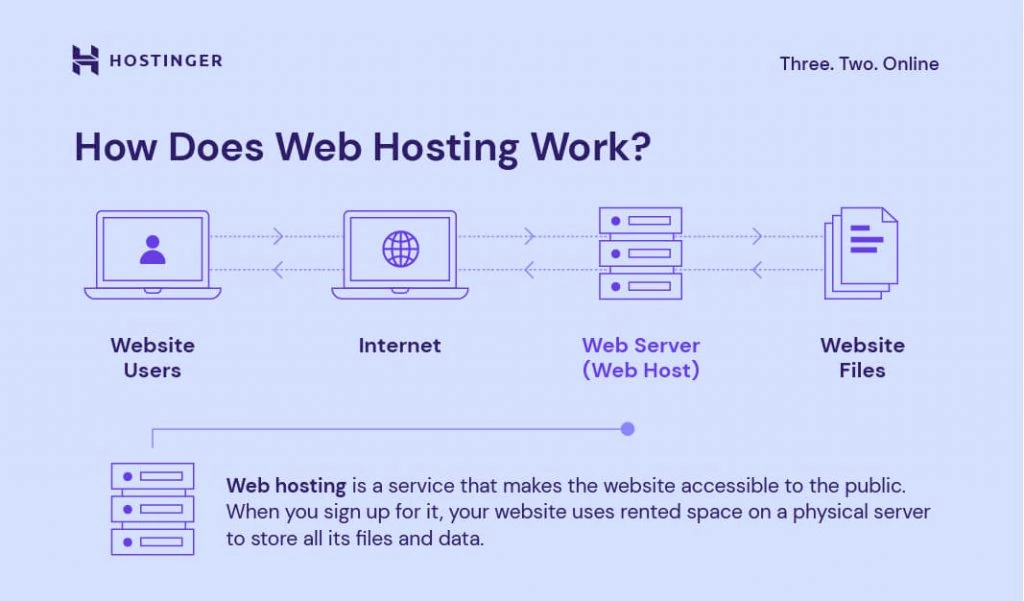Cloud hosting offers reliable and scalable solutions for ecommerce websites. It ensures your site runs smoothly, even during high traffic.
Understanding how cloud hosting works is essential for any ecommerce business. With cloud hosting, your website files are stored on multiple servers. This setup provides flexibility and reliability. If one server fails, another one takes over. This means your website stays online.
It also allows for easy scaling. When traffic spikes, cloud hosting adjusts resources to maintain performance. This ensures a seamless shopping experience for customers. In this post, we will explore how cloud hosting benefits ecommerce sites. We will break down its key features and explain why it’s a smart choice for online businesses.

Credit: www.techtarget.com
Introduction To Cloud Hosting
Cloud hosting distributes website data across multiple servers, ensuring better performance and reliability. Ecommerce websites benefit from this by handling more traffic and ensuring faster load times.
Cloud hosting has transformed the way businesses operate online. It provides a reliable and scalable solution for websites, especially eCommerce sites. Understanding how cloud hosting works can help you make informed decisions for your business.What Is Cloud Hosting?
Cloud hosting uses multiple servers to host websites. Unlike traditional hosting, which relies on a single server, cloud hosting spreads the resources across various servers. This means better performance and less downtime. Your website data is stored in different locations, which enhances security and reliability.Benefits For Ecommerce
Ecommerce websites need to handle high traffic and transactions. Cloud hosting offers scalability, allowing your site to grow without issues. You can quickly add more resources during peak shopping times. Security is crucial for eCommerce. Cloud hosting provides enhanced security features. Your customers’ data remains safe. Another benefit is reliability. Downtime can lead to lost sales. Cloud hosting ensures your site remains online. Multiple servers back up your data, reducing the risk of outages. Cost-efficiency is also a key advantage. You pay for what you use. No need to invest in expensive hardware. In summary, cloud hosting offers a robust solution for eCommerce websites. It provides scalability, security, reliability, and cost-efficiency. “`Key Components
Cloud hosting for ecommerce websites involves several key components. These components ensure the smooth operation and reliability of online stores. Understanding these elements helps in optimizing performance and user experience.
Servers And Storage
Servers in cloud hosting are virtual. They run on physical servers in data centers. These virtual servers provide resources on demand. This allows ecommerce sites to handle traffic spikes.
Storage in cloud hosting is flexible. You can scale it up or down as needed. This means you only pay for what you use. It also ensures that data is always available. High-speed storage systems improve loading times. Faster load times lead to better user experience and higher sales.
Network Infrastructure
Network infrastructure connects servers and storage systems. It includes routers, switches, and firewalls. These components ensure data moves efficiently. They also protect the system from cyber threats.
Reliable network infrastructure reduces downtime. This is crucial for ecommerce websites. Any downtime can lead to lost sales. A strong network ensures constant availability. This keeps customers happy and loyal.
Cloud hosting providers often use Content Delivery Networks (CDNs). CDNs distribute content across global servers. This reduces loading times for international users. Faster sites improve SEO rankings. Better rankings drive more traffic and sales.
Scalability
When it comes to ecommerce websites, scalability is a crucial factor. Imagine your online store experiencing a sudden surge in visitors during a sale or holiday season. Without proper scalability, your website could slow down or even crash, leading to a loss in sales and customer trust. This is where cloud hosting comes in, offering the flexibility to handle increased traffic efficiently.
Handling Traffic Spikes
One of the most significant advantages of cloud hosting is its ability to manage traffic spikes seamlessly. You might remember a time when your website loaded painfully slow due to unexpected visitor numbers. With cloud hosting, such scenarios become a thing of the past. The cloud infrastructure can distribute the load across multiple servers, ensuring your website remains responsive and fast.
For instance, if you run a flash sale, the sudden influx of visitors won’t bog down your site. The cloud handles the traffic surge, so your customers enjoy a smooth shopping experience. Think of it as having an elastic band that stretches and contracts based on the demand.
Auto-scaling Features
Another impressive feature of cloud hosting is auto-scaling. This means that the hosting environment can automatically adjust resources such as CPU, RAM, and storage based on your website’s needs. Have you ever wished your hosting could just read your mind and provide the necessary resources without you lifting a finger? Auto-scaling does just that!
For example, during peak hours, your website might need more processing power. The auto-scaling feature kicks in, allocating more resources to handle the load. Conversely, during off-peak hours, it scales down to save costs. This dynamic adjustment ensures optimal performance and cost-efficiency, making it a win-win situation.
Let’s break it down:
- Increased Traffic: More resources are allocated automatically.
- Decreased Traffic: Resources are scaled back to reduce costs.
With these features, you can focus on growing your business without worrying about technical hiccups.
In conclusion, cloud hosting offers unparalleled scalability for ecommerce websites, ensuring they can handle traffic spikes and efficiently manage resources with auto-scaling. This means happier customers and more successful sales events, ultimately boosting your business’s bottom line.

Credit: www.scalahosting.com
Security Measures
When it comes to eCommerce websites, security is a top concern. After all, your online store handles sensitive customer data, including payment information. Cloud hosting can offer robust security measures to protect your business. Let’s dive into the key aspects of how cloud hosting ensures your eCommerce site remains safe and secure.
Data Protection
Data protection is crucial for any eCommerce website. Cloud hosting providers employ multiple strategies to keep your data safe.
- Encryption: Data is often encrypted both in transit and at rest. This means that even if intercepted, the data is unreadable without the proper decryption keys.
- Backups: Regular backups are made to ensure that your data is not lost. This is especially important in case of a cyber attack or technical failure.
- Redundancy: Cloud hosting providers use redundant storage solutions. This means your data is stored in multiple locations to prevent loss from hardware failures.
These measures ensure that your customer information is secure and your business can run smoothly without worrying about data breaches.
Cybersecurity Protocols
Cloud hosting providers implement stringent cybersecurity protocols to guard against threats. Here are some key protocols:
- Firewalls: Firewalls monitor incoming and outgoing traffic and block suspicious activities. They act as a barrier between your site and potential attackers.
- Intrusion Detection Systems (IDS): IDS monitor your network for any unusual activities. They alert the system administrators of potential threats so immediate action can be taken.
- Regular Updates: Cloud hosting providers frequently update their systems to patch vulnerabilities. This ensures that your site is protected against the latest threats.
These protocols help create a secure environment for your eCommerce site, making it more difficult for hackers to gain access to sensitive information.
In summary, cloud hosting offers strong security measures for eCommerce websites. With data protection strategies like encryption and redundancy, and cybersecurity protocols such as firewalls and intrusion detection systems, you can rest assured that your online store is in safe hands. So, why not leverage these benefits and give your customers the secure shopping experience they deserve?
Performance Optimization
When it comes to running an ecommerce website, performance optimization is crucial. Think of it as the backbone that ensures your site runs smoothly, handles traffic efficiently, and keeps customers happy. But how does cloud hosting play into this? Let’s dive into two key components that make cloud hosting a powerhouse for ecommerce sites: Load Balancing and Content Delivery Networks.
Load Balancing
Imagine your ecommerce site as a busy highway. What happens when all cars try to use one lane? Traffic jams, right? Load balancing is like adding more lanes to that highway. It distributes incoming traffic across multiple servers, ensuring no single server bears the brunt. This not only prevents crashes but also keeps the site speedy and responsive.
Here’s a simple example:
| Without Load Balancing | With Load Balancing |
|---|---|
|
|
Think about it: Would you prefer driving on a crowded, single-lane road or a multi-lane highway? Load balancing makes your ecommerce site the latter, ensuring smooth sailing for all users.
Content Delivery Networks
Ever wondered how some websites load images and videos so quickly, no matter where you are? That’s the magic of Content Delivery Networks (CDNs). A CDN is like a global network of servers that store cached versions of your website’s content. When a user visits your site, the CDN delivers the content from the nearest server, speeding up load times.
Consider this analogy:
Imagine you’re craving pizza. You wouldn’t wait for one to be delivered from across the country, right? You’d order from the nearest pizza place. Similarly, a CDN ensures your website’s “pizza” (content) is delivered from the closest “pizza place” (server), making load times faster for users everywhere.
Here are some benefits of using a CDN for your ecommerce site:
- Faster Load Times: Content is delivered from the nearest server.
- Improved User Experience: Quick loading times keep users happy and engaged.
- Better SEO: Search engines favor fast-loading websites.
In the world of ecommerce, speed is king. A CDN not only enhances performance but also boosts your site’s SEO, making it a win-win for your online store.
So, there you have it! By leveraging load balancing and CDNs, cloud hosting ensures your ecommerce website runs like a well-oiled machine. Isn’t that what every online business owner dreams of?
Cost Efficiency
When it comes to running an ecommerce website, cost efficiency is crucial. Cloud hosting presents a remarkable opportunity to save on operational costs while ensuring high performance and scalability. But how exactly does cloud hosting make this possible? Let’s dive into the details.
Pay-as-you-go Model
One of the biggest advantages of cloud hosting is the pay-as-you-go model. Imagine you’re running a small online store. You start with a few products and a handful of customers. With traditional hosting, you would need to estimate your resources in advance and pay for them, often leading to over or under-provisioning.
However, cloud hosting changes the game. You only pay for the resources you actually use. It’s like paying for electricity; you pay for the exact amount you consume. This model is highly beneficial for ecommerce websites, which often experience fluctuating traffic. During a sale or holiday season, your traffic might spike. With cloud hosting, you can scale up your resources instantly and only pay for that increased usage. Once the traffic subsides, you can scale down and reduce your costs.
Here’s a simple comparison to illustrate this better:
| Traditional Hosting | Cloud Hosting |
|---|---|
| Fixed monthly fee regardless of usage | Pay only for what you use |
| Over-provisioning to handle peak loads | Scale resources up or down as needed |
| Potential wasted resources and higher costs | Cost efficiency and resource optimization |
Resource Allocation
Resource allocation in cloud hosting is akin to having a magic wand. You can allocate more CPU, memory, or storage based on real-time needs. This dynamic adjustment ensures that your ecommerce website runs smoothly without wasting resources.
Let’s say you’re launching a new product and expecting a surge in traffic. Instead of worrying about your website crashing, you can simply allocate more resources on the go. Once the rush is over, you can reduce the resources. This flexibility not only enhances performance but also keeps your costs in check.
Here’s a quick list of benefits:
- Scalability: Easily scale up or down based on traffic.
- Flexibility: Adjust resources in real-time.
- Cost Control: Avoid paying for unused resources.
In conclusion, the cost efficiency of cloud hosting for ecommerce websites cannot be overstated. The pay-as-you-go model and flexible resource allocation ensure you’re not wasting money on unused resources while maintaining top-notch performance. It’s a win-win situation for your business and your wallet.
Integration With Ecommerce Platforms
Cloud hosting offers seamless integration with various ecommerce platforms. This integration provides flexibility and scalability for online stores. It ensures smooth operations, even during high traffic periods. Let’s delve into how cloud hosting integrates with popular ecommerce platforms and the customization options available.
Popular Platforms
Popular ecommerce platforms include Shopify, WooCommerce, Magento, and BigCommerce. These platforms support cloud hosting solutions. They offer easy setup and management for store owners. Shopify is known for its user-friendly interface and robust app ecosystem. WooCommerce is a flexible plugin for WordPress users. Magento provides advanced features for larger businesses. BigCommerce is a comprehensive solution for all business sizes.
Customization Options
Cloud hosting allows extensive customization of ecommerce websites. Store owners can tailor the platform to their needs. This includes personalized themes, plugins, and extensions. Customization improves user experience and site performance. It also enhances security and data management. Cloud hosting supports easy integration of third-party tools. These tools include payment gateways, shipping solutions, and marketing apps. The result is a seamless and efficient ecommerce operation.
Choosing A Cloud Hosting Provider
Choosing a cloud hosting provider for your ecommerce website is a crucial step. The right provider ensures your site runs smoothly and can handle traffic spikes. A good choice enhances user experience and boosts sales. Below, we break down key considerations and top providers.
Key Considerations
First, consider the uptime guarantee. Downtime means lost sales. Look for providers with at least 99.9% uptime.
Next, evaluate scalability options. Your ecommerce site will grow. Ensure the provider can scale resources quickly.
Security is another key factor. Ecommerce sites handle sensitive customer data. Choose a provider with robust security measures.
Customer support matters too. Issues may arise at any time. Opt for a provider with 24/7 support.
Lastly, consider pricing. Understand what you are paying for. Some providers charge hidden fees. Read the fine print.
Top Providers
Amazon Web Services (AWS) is a popular choice. It offers high scalability and reliability. AWS also has strong security features.
Google Cloud Platform (GCP) is another top provider. It provides excellent uptime and security. GCP is known for its innovative tools.
Microsoft Azure offers a wide range of services. It has good support and strong security. Azure is also highly scalable.
DigitalOcean is great for smaller ecommerce sites. It is cost-effective and easy to use. DigitalOcean offers solid performance and support.
Finally, consider Cloudways. It offers managed cloud hosting. Cloudways is user-friendly and provides good support.

Credit: www.hostinger.com
Frequently Asked Questions
How Is Cloud Computing Used In E-commerce?
Cloud computing enhances e-commerce by providing scalable resources, improving website performance, securing data, and enabling seamless customer experiences.
Which Hosting Is Best For An Ecommerce Website?
The best hosting for an eCommerce website includes SiteGround, Bluehost, and Shopify. These providers offer excellent speed, security, and support.
How Does Cloud Hosting Work?
Cloud hosting distributes your website across multiple servers, ensuring high availability and scalability. Resources are allocated as needed.
Is Shared Hosting Good For Ecommerce?
Shared hosting can be suitable for small eCommerce sites. It is budget-friendly but may lack performance for larger stores. For higher traffic and better security, consider VPS or dedicated hosting.
Conclusion
Cloud hosting offers many benefits for ecommerce websites. It ensures scalability, security, and reliability. Businesses can handle traffic spikes with ease. Costs are flexible, based on usage. Data stays safe with regular backups. Quick load times improve user experience. Overall, cloud hosting helps ecommerce sites run smoothly and efficiently.
Consider cloud hosting for a seamless online store experience.

